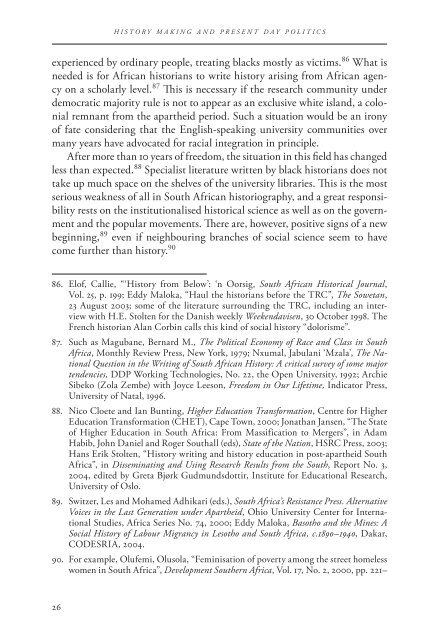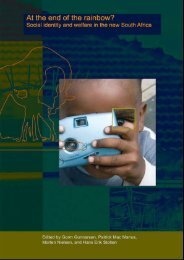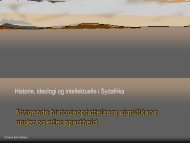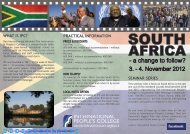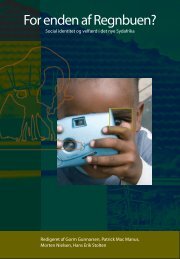History Making and Present Day Politics - Stolten's African Studies ...
History Making and Present Day Politics - Stolten's African Studies ...
History Making and Present Day Politics - Stolten's African Studies ...
You also want an ePaper? Increase the reach of your titles
YUMPU automatically turns print PDFs into web optimized ePapers that Google loves.
h i s t o r y m a k i n g a n d p r e s e n t d a y p o l i t i c s<br />
experienced by ordinary people, treating blacks mostly as victims. 86 What is<br />
needed is for <strong>African</strong> historians to write history arising from <strong>African</strong> agency<br />
on a scholarly level. 87 This is necessary if the research community under<br />
democratic majority rule is not to appear as an exclusive white isl<strong>and</strong>, a colonial<br />
remnant from the apartheid period. Such a situation would be an irony<br />
of fate considering that the English-speaking university communities over<br />
many years have advocated for racial integration in principle.<br />
After more than 10 years of freedom, the situation in this field has changed<br />
less than expected. 88 Specialist literature written by black historians does not<br />
take up much space on the shelves of the university libraries. This is the most<br />
serious weakness of all in South <strong>African</strong> historiography, <strong>and</strong> a great responsibility<br />
rests on the institutionalised historical science as well as on the government<br />
<strong>and</strong> the popular movements. There are, however, positive signs of a new<br />
beginning, 89 even if neighbouring branches of social science seem to have<br />
come further than history. 90<br />
86. Elof, Callie, “‘<strong>History</strong> from Below’: ‘n Oorsig, South <strong>African</strong> Historical Journal,<br />
Vol. 25, p. 199; Eddy Maloka, “Haul the historians before the TRC”, The Sowetan,<br />
23 August 2003; some of the literature surrounding the TRC, including an interview<br />
with H.E. Stolten for the Danish weekly Weekendavisen, 30 October 1998. The<br />
French historian Alan Corbin calls this kind of social history “dolorisme”.<br />
87. Such as Magubane, Bernard M., The Political Economy of Race <strong>and</strong> Class in South<br />
Africa, Monthly Review Press, New York, 1979; Nxumal, Jabulani ‘Mzala’, The National<br />
Question in the Writing of South <strong>African</strong> <strong>History</strong>: A critical survey of some major<br />
tendencies, DDP Working Technologies, No. 22, the Open University, 1992; Archie<br />
Sibeko (Zola Zembe) with Joyce Leeson, Freedom in Our Lifetime, Indicator Press,<br />
University of Natal, 1996.<br />
88. Nico Cloete <strong>and</strong> Ian Bunting, Higher Education Transformation, Centre for Higher<br />
Education Transformation (CHET), Cape Town, 2000; Jonathan Jansen, “The State<br />
of Higher Education in South Africa: From Massification to Mergers”, in Adam<br />
Habib, John Daniel <strong>and</strong> Roger Southall (eds), State of the Nation, HSRC Press, 2003;<br />
Hans Erik Stolten, “<strong>History</strong> writing <strong>and</strong> history education in post-apartheid South<br />
Africa”, in Disseminating <strong>and</strong> Using Research Results from the South, Report No. 3,<br />
2004, edited by Greta Bjørk Gudmundsdottir, Institute for Educational Research,<br />
University of Oslo.<br />
89. Switzer, Les <strong>and</strong> Mohamed Adhikari (eds.), South Africa’s Resistance Press. Alternative<br />
Voices in the Last Generation under Apartheid, Ohio University Center for International<br />
<strong>Studies</strong>, Africa Series No. 74, 2000; Eddy Maloka, Basotho <strong>and</strong> the Mines: A<br />
Social <strong>History</strong> of Labour Migrancy in Lesotho <strong>and</strong> South Africa, c.1890–1940, Dakar,<br />
CODESRIA, 2004.<br />
90. For example, Olufemi, Olusola, “Feminisation of poverty among the street homeless<br />
women in South Africa”, Development Southern Africa, Vol. 17, No. 2, 2000, pp. 221–<br />
26


